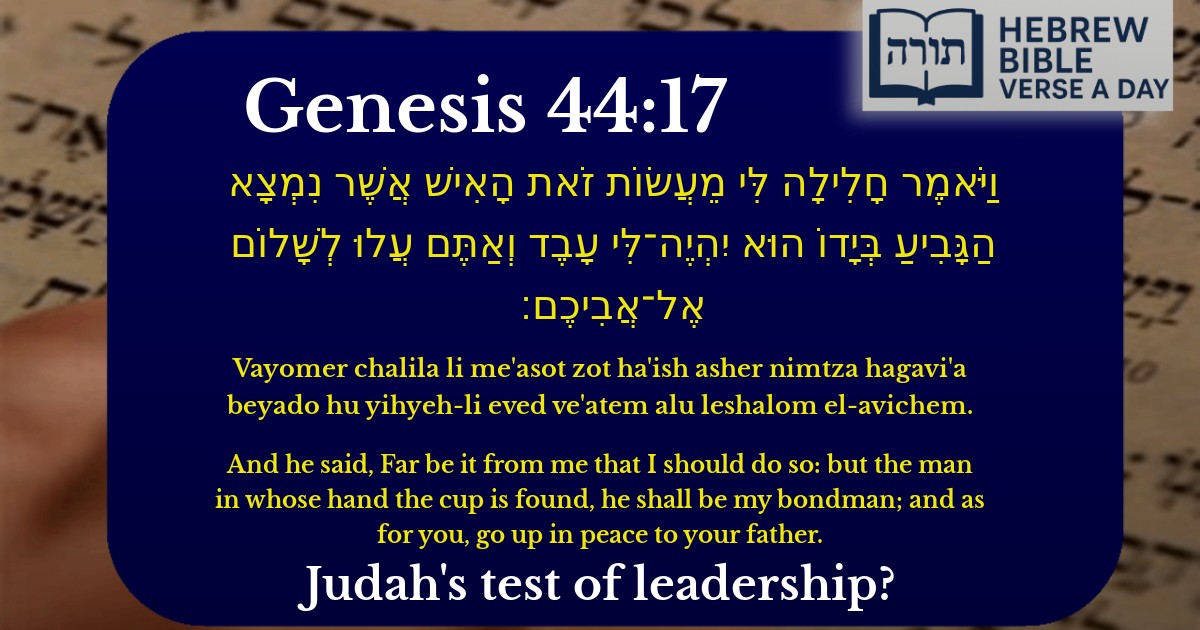Join Our Newsletter To Be Informed When New Videos Are Posted
Join the thousands of fellow Studends who rely on our videos to learn how to read the bible in Hebrew for free!
Hebrew Text
וַיֹּאמֶר חָלִילָה לִּי מֵעֲשׂוֹת זֹאת הָאִישׁ אֲשֶׁר נִמְצָא הַגָּבִיעַ בְּיָדוֹ הוּא יִהְיֶה־לִּי עָבֶד וְאַתֶּם עֲלוּ לְשָׁלוֹם אֶל־אֲבִיכֶם׃
English Translation
And he said, Far be it from me that I should do so: but the man in whose hand the cup is found, he shall be my bondman; and as for you, go up in peace to your father.
Transliteration
Vayomer chalila li me'asot zot ha'ish asher nimtza hagavi'a beyado hu yihyeh-li eved ve'atem alu leshalom el-avichem.
Hebrew Leining Text
וַיֹּ֕אמֶר חָלִ֣ילָה לִּ֔י מֵעֲשׂ֖וֹת זֹ֑את הָאִ֡ישׁ אֲשֶׁר֩ נִמְצָ֨א הַגָּבִ֜יעַ בְּיָד֗וֹ ה֚וּא יִהְיֶה־לִּ֣י עָ֔בֶד וְאַתֶּ֕ם עֲל֥וּ לְשָׁל֖וֹם אֶל־אֲבִיכֶֽם׃ <span class="mam-spi-samekh">{ס}</span>
וַיֹּ֕אמֶר חָלִ֣ילָה לִּ֔י מֵעֲשׂ֖וֹת זֹ֑את הָאִ֡ישׁ אֲשֶׁר֩ נִמְצָ֨א הַגָּבִ֜יעַ בְּיָד֗וֹ ה֚וּא יִהְיֶה־לִּ֣י עָ֔בֶד וְאַתֶּ֕ם עֲל֥וּ לְשָׁל֖וֹם אֶל־אֲבִיכֶֽם׃ {ס}
🎵 Listen to leining
Parasha Commentary
📚 Talmud Citations
This verse is quoted in the Talmud.
📖 Sotah 13b
The verse is referenced in the context of discussing Joseph's actions and his righteousness, particularly how he dealt with his brothers.


Context of the Verse
This verse (Bereshit 44:17) records Yosef's response after his silver goblet was discovered in Binyamin's sack. Yosef, still unrecognized by his brothers, pretends to be an Egyptian viceroy and declares that only the one found with the goblet will remain as his servant, while the others may return to their father in peace.
Yosef's Intentions
Rashi explains that Yosef's plan was to test whether his brothers would abandon Binyamin as they had once abandoned him (Bereshit 37). By framing Binyamin, Yosef sought to see if the brothers had repented for their earlier actions and would now stand up for their youngest brother.
The Phrase "חָלִילָה לִּי" (Far Be It From Me)
The Ramban notes that Yosef's exclamation "חָלִילָה לִּי" demonstrates his righteousness. Though he had the power to enslave all the brothers, he chose to punish only the "guilty" party, showing judicial restraint. This mirrors the divine attribute of justice tempered with mercy.
The Test of Brotherhood
The Midrash (Bereshit Rabbah 92:8) highlights that Yosef's statement "הוּא יִהְיֶה־לִּי עָבֶד" (he shall be my bondman) was designed to evoke the brothers' protective instincts toward Binyamin. Yehuda's subsequent plea for Binyamin (chapter 44) proves they had indeed changed.
Halachic Perspective
The Talmud (Sanhedrin 58b) discusses this incident regarding the laws of servitude. While Egyptian law might have permitted enslaving all the brothers, Yosef adhered to the emerging Israelite standard of individual responsibility, as later codified in the Torah (Devarim 24:16).
Psychological Insight
Rabbi Samson Raphael Hirsch observes that Yosef's offer to let the other brothers return "לְשָׁלוֹם אֶל־אֲבִיכֶם" (in peace to your father) was particularly poignant, as it forced them to confront whether they could face their father after losing another son.